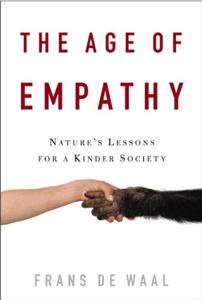
Want to learn the ideas in The Age of Empathy better than ever? Read the world’s #1 book summary of The Age of Empathy by Frans de Waal here.
Read a brief 1-Page Summary or watch video summaries curated by our expert team. Note: this book guide is not affiliated with or endorsed by the publisher or author, and we always encourage you to purchase and read the full book.
Video Summaries of The Age of Empathy
We’ve scoured the Internet for the very best videos on The Age of Empathy, from high-quality videos summaries to interviews or commentary by Frans de Waal.
1-Page Summary of The Age of Empathy
Overview
Throughout history, many thinkers have said that humans are inherently evil. They claim that people will do anything to improve their position in life, even if it means hurting others. However, recent events like the Holocaust and other wars seem to indicate otherwise. Perhaps we need a more nuanced view of humanity?
What if the things that have helped us survive are empathy and connection to others? What if, instead of a desire to kill people, soldiers enlist because they want to belong? Let’s explore these possibilities and take a closer look at what drives us.
In this passage, you’ll learn about the walls of Jericho and why they were built. You’ll also learn what herd instinct is and how it has affected our evolution. Finally, you will discover how to tell if a couple’s been together for a long time.
Big Idea #1: There is a popular but misguided tendency to view human nature as inherently selfish.
The idea that human nature is selfish is widespread. This notion is also backed up by the theory of Social Darwinism, which states that the strong will survive and the weak will perish. In other words, it’s a survival-of-the-fittest mentality between those who have money and those who don’t.
Social Darwinism suggests that it’s counterproductive for those who succeed in life to feel obligated to help, as they can get dragged down by those who are struggling. This ideology has found its way into the business world, where big businesses have been known to sacrifice smaller ones. For example, John D. Rockefeller Jr., a businessman from the early twentieth century, believed that bigger businesses would always beat out smaller ones because of this natural law; he also noted that this was “merely” how things worked in nature and society.
These are all misunderstandings of human nature and can be dangerous. ENRON believed that people were driven by fear and greed, which created a horrible corporate environment as well as a brutal system called Rank and Yank in which managers ranked employees on a five-point scale, then fired anyone who received a five. This led to 20 percent of the workforce being fired every year.
Enron (a company) was ruthless in its practices. It would cause blackouts and shortages just to raise the prices of energy costs, even though it knew that this could be harmful for people who were stuck in elevators or on respirators.
Although this business philosophy worked for a while, it eventually backfired when the company went bankrupt in 2001.
Big Idea #2: History shows that war and violence haven’t always been part of the human experience.
Winston Churchill, a famous British Prime Minister once said that the story of human history is war. But it’s not as simple as that. History has had long periods of peace and harmony with brief episodes of violence.
For example, the walls of Jericho are often cited as one of the first examples of human warfare.
However, recent studies show that the walls were probably built to protect against mudflows.
Humans have been in constant danger of being wiped out throughout history. Our ancestors lived in small groups, and there were only a few thousand humans on the planet. It’s likely that they didn’t worry much about warfare at all.
Our ancestors were hunter-gatherers, so their lives were similar to the modern-day Bushmen of Africa. They lived in a peaceful environment and had few violent confrontations.
The reason why we have wars and organized combat is not because humans are naturally violent. It’s because of our natural tendency to stick together in groups.





